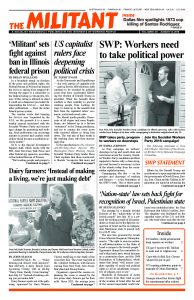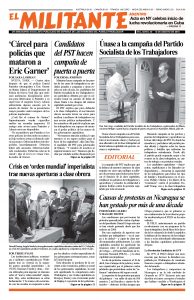In a broadside attack on freedom of the press and political rights, the Federal Bureau of Prisons has banned the Militant, saying it has stopped delivering the paper to a subscriber in the federal lockup in Greenville, Illinois. If this ruling is allowed to stand it could set a dangerous precedent for impounding the Militant — and then other publications — from the entire federal prison system.
The warden wrote that banning the Militant was “requested by the S.I.S. on the grounds it is a newsweekly journal associated with the Socialist Workers Party and encourages change by protesting and striking. Such publication can encourage inmates to protest and conduct work strikes which become a institution security matter.”
S.I.S. is the Special Investigative Support staff, which works with the FBI, Joint Terrorism Task Force and other federal spy agencies, according to the Federal Bureau of Prisons.
“We’re asking people and groups to send letters of protest to help get this ruling reversed,” said Militant editor John Studer.
The banning of the Militant “is an uncalled-for restriction on the freedom of the press and prisoners’ rights,” Karin Deutsch Karlekar, director of Free Expression at Risk Programs at PEN America, wrote to prison authorities Aug. 1. “The Federal Bureau of Prison’s claim that it would directly lead to rebellion has no basis and their decision to censor the Militant should be overturned.”
The subscriber behind bars had been receiving the paper for over a year. After being transferred to the Federal Correctional Institution in Greenville he received a few issues, but this was brought to a halt with the June 11 issue.
The Militant didn’t find out about this censorship until July 20 when the paper received a notice it was now a “Rejected Publication.” The notice said, “A publication may be rejected if it is determined detrimental to the security, good order, or discipline of the institution or if it might facilitate criminal activity.”
Articles in the rejected issues of the Militant discuss political developments and point to important working-class struggles taking place in the U.S. and abroad, aspects of which are covered by many other newspapers and publications. Headlines in the impounded issues include, “3,000 Rail Workers Strike Against Canadian Pacific,” “Workers in Puerto Rico Respond to Social Disaster,” “Amnesty for All Immigrants in the US!” and “Join July 12th Protest Against Pension Cuts!”
“To ban the Militant because it’s ‘associated with the Socialist Workers Party’ is a ruling that the party is somehow beyond the protections of the Constitution,” said Studer. “The SWP fought against similar government attacks when it sued and campaigned against FBI spying and disruption in 1973 and won.”
“Workers behind bars have the right to read the political views they want and need, including about the struggles of workers and farmers,” Studer said. “It helps them be part of the world and their class.”
Militant attorney David Goldstein of the prominent civil liberties law firm Rabinowitz, Boudin, Standard, Krinsky and Lieberman, is preparing a challenge to the ruling.
The Militant, which is mailed to about 115 subscribers in some 60 prisons across the country, has faced a number of impoundments by prison authorities — nearly two dozen issues in state prisons in Florida over the past several years. All but a few were reversed on appeal. An impoundment of an issue by authorities at the federal supermax prison in Florence, Colorado, was overturned in 2014.
Earlier this year supporters of political rights succeeded in beating back newly imposed Federal Bureau of Prisons moves that severely restricted inmates in federal prisons from being able to get and read books. The Bureau imposed a policy that books could only be ordered through one prison-approved vendor, in a cumbersome procedure limited to their stock, and with prices marked up 30 percent. Shipments of books from friends and relatives were barred.
Among those who have spoken out against prison censorship of the Militant include the American Civil Liberties Union, National Lawyers Guild, Amnesty International, PEN America and prisoner rights, church and other organizations.
Send letters of support to demand reversal of banning the Militant at Greenville to Regional Director Sara M. Revell, Federal Bureau of Prisons, Gateway Complex Tower II, 8th floor, 400 State Avenue, Kansas City, KS 66101-2492.

